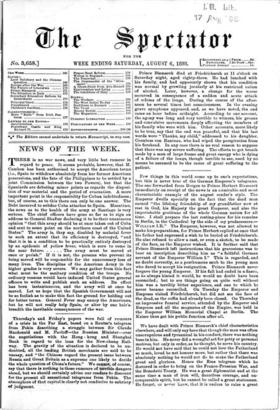Thursday's and Friday's papers were full of rumours of a
crisis in the Far East, based on a Renter's telegram from Pekin describing a struggle between Sir Claude Macdonald and M. Pavloff—the Russian Minister—over the negotiations with the Hong - kong and Shanghai Bank in regard to the loan for the New-chang Rail- way. The gravity of the situation is declared to be tin- -doubted, all the leading British merchants are said to be uneasy, and "the Chinese regard the present issue between Russia and Great Britain as a supreme one likely to decide the whole question of China's future." We cannot, of course, say that there is nothing in these rumours of terrible dangers ahead, but we should certainly advise our readers to discount for the present all sensational telegrams from Pekin. The atmosphere of that capital is clearly not conducive to sobriety of judgment. Prince Bismarck died at Friedrichsruh at 11 o'clock on Saturday night, aged eighty-three. He had lunched with his family, and had apparently shown that his condition was normal by growling jocularly at his restricted ration of alcohol. Later, however, a change for the worse occurred in consequence of a sudden and acute attack of (edema of the lungs. During the course of the after- noon he several times lost consciousness. In the evening grave symptoms appeared, and, as we have noted, the end came an hour before midnight. According to one account, the agony was long and very terrible to witness, his groans and convulsive movements deeply affecting the members of his family who were with him. Other accounts, more likely to be true, say that the end was peaceful, and that his last words were "Thanks, my child," addressed to his daughter. Countess von Bautzen, who had wiped the perspiration from his forehead. In any case there is no real reason to suppose that there was any severe suffering. The efforts to get breath made by a man of large frame and great energy who is dying of a failure of the lungs, though terrible to see, need by no means be assumed to be the cause of great suffering to the patient.


































